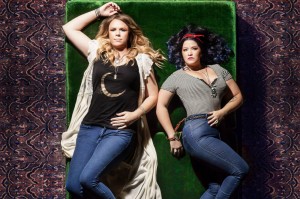Songwriting is at the heart of Granville Automatic

Granville Automatic’s Elizabeth Elkins and Vanessa Olivarez will play at Ventosa Vineyards as part of The Smith’s Jan Regan Club Series on March 9, 2019.
Many singer-songwriters often plumb the depths of their personal histories to create songs of that resonate with them and their audiences. Elizabeth Elkins and Vanessa Olivarez of the alt-country band Granville Automatic have largely turned to American history instead.
Their 2018 album, “Radio Hymns,” unleashes 13 compelling stories of Nashville’s eclectic past, where the the duo are based, from Jimi Hendrix’s year in Nashville to Andrew Jackon’s grief as a widower.
And before that, their 2015 project, “An Army Without Music: Civil War Stories from Hallowed Ground,” unearths narratives from places where their memories have been erased by time and progress.
“The key for us is finding a way to connect our own lives to the stories of the past,” says Elkins, a history buff and former punk rocker who calculates that at least 60 percent of the songs she and Olivarez have co-written are based on other people’s true stories.
Granville Automatic will be sharing their blasts of Americana past in an all-acoustic show on Saturday, March 9 at Ventosa Vineyards, 3440 Route 96A, Geneva. The 7:30 p.m. concert is part of the Smith Center for the Arts’ Jan Regan Club Series, an ongoing project that presents music in smaller, more intimate venues in and around Geneva. Finger Lakes Public Radio WEOS 89.5FM Geneva is the media sponsor for the show.
One example of that connection? The song Black Avenue Gallows on “Radio Hymns” glimpses grimly into a public hanging that took place in 1865 in what is now Nashville’s Music Row. Elkins and Olivarez learned about the event when they worked at BMG in Atlanta, one of the world’s largest music publishers.
Yes, Elkins, the stoic blond with the guitar who sings harmony, and Olivarez, the lead-singing raven-haired diva who has been compared to Linda Ronstadt, are longtime professional songwriters. And if you haven’t yet heard the original songs they perform as Granville Automatic, then you may have heard the songs they have written for Billy Currington, Sugarland, Kira Isabella, Wanda Jackson, as well as for TV shows such as ABC’s “American Crime” and “The Lying Game,” as well as Netflix’s “The Ranch.”
Now based in Nashville, a city that Olivarez, a Texas native, describes as “spring break for songwriters,” the two don’t collaborate elbow-to-elbow when ushering forth new music, but instead write independently. When a song is near the finish line, one sends it to the other to fill in that elusive hook or bridge, or to tweak a word or phrase. Or to save it from themselves. Those finishing touches seem to make all the difference in the world.
“I’m ADD (attention deficit disorder). I write a lot of songs in my head but then they seem to blur into one song. Elizabeth keeps me grounded,” says Olivarez. She often takes notes on snippets of conversations she hears in public, or remembers an expression, and builds a story from there.
“I love to harness Vanessa’s energy. Sometimes I get too rock ’n roll,and she fixes it,” says Elkins. “We are completely opposite personalities in how we work, but we balance each other out.”
The women welcome other songwriters into their sphere as well. Some of the cuts on “Radio Hymns,” included the brainpower of Ben Fields (a Rochester native who now calls Brooklyn home) and Jim Lauderdale.
In the end, it’s hard to tell which writer originated which song–they all seem to be a seamless braid of two creative spirits merging into one creative endeavor. Even their producers can’t guess.
As for the duo’s band name, that too has a love of writing at its core. The Granville Automatic was the eight-track tape of 19th century typewriters, promising for the first time that all functions could be accomplished from its beautiful keyboard yet failing miserably and swiftly. Only a handful are left on the collector’s market, and at a hefty price. Olivarez, an avid typewriter collector, opted to simply borrow the name.